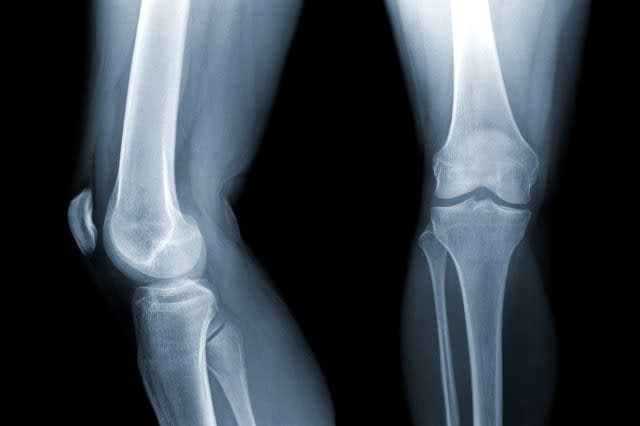How to cut your risk of osteoporosis


From the age of 40 onwards, our bone density naturally declines, increasing the risk of osteoporosis, a condition that weakens the bones and makes them more fragile and prone to breaks. One-in-two women and one-in-five men over the age of 50 in the UK will break a bone, and the most common cause is osteoporosis. Because the condition has no other symptoms, a break or fracture may be the first time you realise there's a problem, but there are things you can do to reduce your risk.
See also: How diet affects arthritis
See also: Seven things you can do to ease joint pain
Weight-bearing exercise
Weight-bearing exercise and resistance exercise is one of the best ways to strengthen the bones and reduce the risk of injury. Aim to do five hours of weight-bearing exercise a week, such as brisk walking, running, dancing, or sports such as tennis or badminton. (Swimming and cycling aren't weight-bearing exercises).
As well as aerobic exercise, doing muscle-strengthening activities on two or more days a week will help to work all the major muscle groups. If you don't want to hit the gym, invest in an exercise DVD and weights and work out at home. This Davina Vinyl Dumbbell Set, costs £33.99.
Top up on calcium
Adults are recommended to consume at least 700mg of calcium each day, and 1,200mg if you've already been diagnosed with osteoporosis. A large glass of milk, a thick slice of cheddar or a portion of yoghurt provides around 1,000mg. The lactose intolerant can still get their daily dose by way of white beans, sardines, leafy greens and almonds, while some products such as instant oatmeal, orange juice and soy milk are fortified with calcium. Or you could take a supplement, such as Boots Pharmaceuticals Calcium with Vitamins D & K - 60 Tablets - £3.05.
Watch how much protein and salt you eat
Too much protein causes the body to make acid, which drains calcium and consequently leaves bones weaker. You don't need to cut out protein but make sure you're eating a balanced diet (avoid very high protein weight-loss diets) and eat plenty of fresh fruit and veg, dairy and carbs. Salt is thought to speed up calcium loss in the body, so stick to the recommended 6g daily limit, and be careful when buying processed foods and ready meals as these can contain high levels of salt.
Get some sunshine
Calcium is of no use to the body unless it's able to absorb it - and to do that, it needs vitamin D. While limited amounts of vitamin D can be found in certain foods (such as oily fish, egg yolks and liver), getting some sunshine is best. For most of us, short exposure to sunlight without wearing sunscreen (10 minutes twice a day) throughout the summer should provide enough vitamin D for the whole year.
Cut back on alcohol
Alcohol is known to reduce the amount of calcium your body absorbs. Cut back on the booze (the NHS recommends not drinking more than 14 units of alcohol a week with regular 'days off'), and drink plenty of water to keep your bones healthy.
Stop smoking
Smokers are known to be at greater risk of osteoporosis. If you want to reduce your risk of broken bones, ask your GP for help to quit.
Don't crash diet
Crash dieting can increase your chances of developing osteoporosis, especially in women, since it can reduce the amount of oestrogen in the body, a hormone that protects those all-important bones. If you are overweight, opt for a sensible, healthy-eating weight loss plan.



